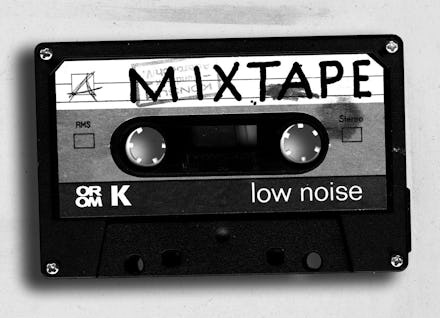Mixtape Culture is Keeping Hip-Hop Fresh

Last week, hip-hop legends Busta Rhymes and Q-Tip released a collaborative mixtape, The Abstract & The Dragon. The album is a major throwback to that 90s mixtape sound: simple drum loops, classic flows, and a raw production style "bringing that real feel-good boom-bap shit back to life," as Busta Rhymes says on the opening track — that "unfuckwithable" sound.
It is a solid offering, but coming off the impeccable year of high-quality mixtapes that we had, The Abstract & The Dragon seems a little flat. It sounds like a classic mixtape, but mixtapes in 2013 don't sound like they did in 1990 — they sound like albums. And often, they sound even better.
The styles of mixtape culture have not changed as much as the values. Mixtapes have traditionally served as a shadow distribution network for hip-hop, an alternative to mainstream forms of radio and studio recordings. In the mixtape's heyday, rappers could move raps and push their brand without having to make concessions for radio trends and styles. They kept things raw and didn't put concerted songwriting effort into them — they did a lot of freestyling over beats jacked from the radio. Fans would buy these freestyle compilation mixtapes from DJs like DJ Clue, Kid Capri, and Grandmaster Flash, copy them, and spread them from boombox to boombox out of NYC and into Jersey and the suburbs. The tapes got fuzzier as more and more people copied them, but that raw sound became prized. It defined early masterpieces like Wu-Tang's Enter the Wu-Tang: 36 Chambers and Nas' Illmatic.
The raw, DIY hustle of the mixtape has had such a profound influence on hip-hop culture that the style and the terminology have persisted even though the mixtapes of today sound and feel nothing like those of the past. Mixtapes still serve their original purpose — spreading the word and freeing rappers from the constraints of making marketable music — but now it's just being done with new layers of effort and polish. Free albums now have studio-quality sound, but are governed by none of the traditional studio conventions like poppy hooks or simplistic radio-structures. The result is that many recent mixtapes are miles beyond studio hip-hop in quality, intricacy, and artistic value. The critics have eaten it up — check out any end of the year hip-hop list, at least half will be mixtape releases. This bump in popularity has helped drive a renewed interest in alternative hip-hop.
Chance The Rapper won Spin's Rapper of the Year title and a feature on a new Justin Bieber song, all off the strength of his insightful, psychedelic Acid Raps tape alone. He didn't sell a single album or launch a tour of his own until October; he just had 13 free songs, each with multiple hooks, unpredictable beat structures, sexy ad-libs, and unique flows. "Juice" brings in a little of that throw-back fuzz, but controls it with some meticulous production manipulations.
A listener can hear the incredible amount of effort and money that went into making Acid Raps. Early 2000 mixtapes, such as Lil Wayne's Dedication and 50 Cent's 50 Cent is the Future, never even got mastered.
Even the more bare-bones, core hip-hop offerings of the year, like Action Bronson's Blue Chips 2 and Big K.R.I.T.'s King Remembered in Time, have an artistry and attention to detail that earlier mixtapes never bothered with. Bronson takes some hilarious stylistic risks on his album, such as trying to one-take rap a ridiculous story about forcing Patrick Ewing to throw the 1995 Eastern Conference Finals. He keeps cracking up during the lyrics: "I showed him some stacks then showed him the gat like: 'You're going to miss the finger roll right?' / 'Yes, Mr. Baklava.' / Then I cartwheeled into an aqua car." Instead of cutting or re-recording, Bronson just laughs and starts in again when the loop comes around. The technique is a big pun on the "rough-cut" quality of mixtapes, but it takes that free and loose feeling to a new creative level because of its amazing production values.
Since album sales are at all-time lows and all music is essentially free, artists might as well release their music free off the bat and make it easily accessible. Now that rappers are less concerned with selling music, they can put more time into crafting bold and unique sounds. Critics are also kinder to free releases. Chance The Rapper's Acid Raps would not have had as brilliant of a reception — and would not have pushed the man's career as far — if it had been released for sale. The combination of that core creative freedom — which mixtapes have always afforded — and the new serious artistic effort going into mixtape production (which is only encouraged by the broad availability of high quality studio software like Pro Tools) is pushing hip-hop music as a whole to the next level. It's keeping rap fresh.